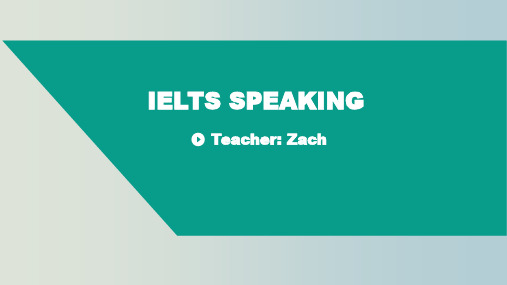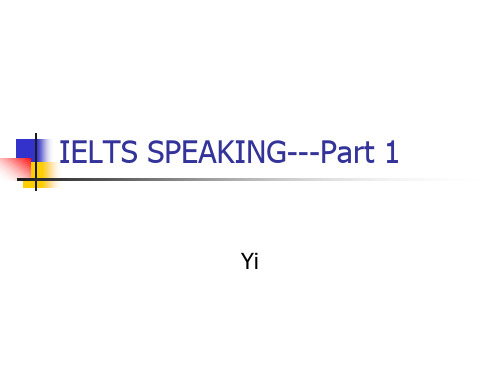精编雅思口语partone讲义讲课稿
超详细!雅思口语part1表达技巧(雅思口语老师独家课件)

• Only when you find peace in you heart will you keep good relationships with others
Fluency and Coherence
IELTS SPEAKING
Teacher: Zach
Syllabus
课程大纲
1. 口语考试介绍+评分细则+Part1表达结构 2. Part1分类话题+必问话题 3. Part2结构技巧+人物类高频话题 4. Part2人物类其他话题(2) 5. Part2地点类话题 6. Part2经历类话题 7. Part2物品类话题技巧(1) 8. Part2物品类高频话题(2) 9. Part3回答结构和题型(1) 10. Part3题型(2)
Read the sentence
• Water is the best beverage for hydration, but some people don’t like the taste of it on its own. Adding lemon enhances water’s flavor, which may help you drink more and promote hydration(补水).
• Books are found all over the place.
Lexical Resource
Paraphrase
• avoid using big and long words without really knowing what they mean. • Range of words(Don't overuse) • Idioms
雅思满分流利口语Part 1全解析

雅思满分流利口语Part 1全解析no more you雅思满分流利口语:Part1全解析本文节选自贾若寒著《雅思满分流利口语》一书。
第3章雅思口语考试Part1全解析雅思口语考试Part1是雅思口语考试中相对而言难度最低的一个部分,但是这个部分发挥得好坏对于Part2和Part3有着至关重要的影响,甚至决定了整场考试的成败。
雅思口语考试是考官在对考生测试的同时会对某些评分项进行评分,比如发音、流利程度等。
如果考生在Part1没有展现出自己应有的水平或者说由于紧张而使得自身的语言水平被完全限制住,那么这个时候考官对考生留下的印象就不会好,最后的分数出来也就不会高,这也是一直所说的一个原则:Part1没有发挥好,最后的分数一定不会高;Part1发挥好了,则最后的分数也不一定会高,还要看考生Part2和Part3的表现。
因此考生要对雅思口语考试Part1作充分的准备才能确保自己不会输在起跑线上。
本章节将会从各方面提高考生雅思口语考试Part1的应试能力。
第1节Part1个人信息类口语考题真题荟萃在雅思口语考试的Part1中,雅思口语考官手中会有一本题目手册的文件夹,考官会翻阅文件夹选择不同的话题来测试考生对于特定考题的回答能力,也就是考生的英语水平和逻辑思维。
我们收集到了几乎所有的雅思口语考官手中的雅思口语考试真题,从本节开始,将一一为大家展现雅思口语考试的真题,并且会给大家提供实用的应试技能指导以及简单易学的参考答案,请大家慢慢学习。
首先要关注的是个人信息类口语考题,这些考题的大致内容差不多,但是问题的方式比较多,大家来了解一下这些真题。
Do you work or are you a student?这是一个几乎所有考生都会被问到的问题。
怎么来回答好这个问题呢?有以下两种方式:A:I am a student and I am studying in a university in Shanghai.Well,it is a famous university in China,Shanghai JiaoTong University.And my major is Electronic Communication and I like my major very much.I hope to go abroad to further the education.B:I am working as an assistant movie producer and I have participated in many worldclass movies including many Jackie Chan movies and I like my job very much. And I want to improve my English so I take the IELTS test.考生在回答第一个问题的时候要表现得有很自信,给出的答案要内容充分,把学习和工作的大致内容说清楚,并且连带说明参加雅思考试的原因。
雅思口语part1答题技巧课件-原创

What is famous about your hometown?
Criteria评分标准
常见adj替换
6
commonly used adjs:
good---fantastic,fabulous,brilliant,excellent,
beautiful---breathtaking,gorgeous,amazing
interesting---intriguing,amusing,hilarious happy---delighted,overjoyed,pleasant
Exercises:
Do u like rainy days? How does rain affect people's mood? What types of weather do chinese people usually like? Is weather important in traveling ?
知识点阶段性总结
答题思路:表达观点+内容展开 表达观点时常用副词: 语气较强的副词开句:undoubtedly, unquestionably,absolutely, definitely, Obviously, apparently, certainly, surely, etc. 语气较平缓的副词开句:normally,actually, generally, frankly, honestly, basically, theoretically, technically, currently, and etc. 表达观点时常用词组: in my opinion, from my point of view, in my view, from my perspective,etc. 句首可用的词组:as a matter of fact , off the top of my head, as far as i'm concerned , 展开技巧: 举例子、列原因、表达感受
雅思口语PART1课件.ppt

(Accurate +Diverse)
Topic
Development 思维能力
Delivery 表达能力
1) Fully Developed 2) Coherent 3) Idea Connection
& Progression (Task 1&2: To state/describe)
1) Pronunciation
major is finance. I think it has a bright future and I can get a well-paid job. 2. What are subjects you like and dislike? The subject that I am really into is English. Cause it is widely used around the world. I can travel around the world without a guide. But the subject I dislike is Math. It is hard to me study. Every time I attend the math exam, that really drives me crazy.
benefits 高年薪,诱人的将近和优厚的待遇 Competition is getting tougher and tougher. 竞争越来越激烈。 Be on top all the time 总是第一
Study & Work
1. Are you studying or working? I am a university student from Jilin University. My
IELTS Speaking 开课与Part1 优质课件

没有听懂整个问题:
Beg your pardon? Excuse me Sorry I didn’t quite follow you./ I didn’t quite
• Driving
Dancing Swimming
Part I 三剑客
Home/ Hometown
Work/ Study
常规题目三选一
Hobby/ Interest
1.Hobby & Interest
爱好的表达:
have a passion for.. be keen on be fond of find …fascinating be enthusiastic about be into sth
catch the question. / I missed that question. Could you say it again?/ Could you repeat it?
Could you please rephrase your question? 没听懂个别单词时:
Excuse me, could you please explain the word…? Sorry ,I didn’t get the word… 当理解题目不肯定时:
• 例2,My favorite singer is Li Yuchun, who was the winner of the 2005 Super Girl Contest. She looks like a tomboy.
• 例3,My favorite singer is Li Yuchun, who was the winner of the 2005 Super Girl Contest. As a matter of fact, she looks like a tomboy.
精编雅思口语partone讲义

三 Top FAQs about IELTS Speaking Exam
1.雅思口语要考六分,需要多少词汇量? 10.考试时紧张怎么办?
2.口语考试的时候,是不是要多用大词? 11.考官都是英国人吗?
3.语音语调在口语考试中很重要吗?
12.考官是不是都对考生很有耐心?
4.口语要考高分是不是需要说很长的句子?13.语法对雅思口语重要吗?
5分 基础水平 可部分运用英语,在大多数情况下可明白大致的意思。虽然经常出现错 误,但在经常涉及的领域内可应付基本的沟通。 4分 有限水平 只限在熟悉的状况下有基本的理解力,在理解与表达上常发生问题,无 法使用复杂英语。 3分 极有限水平 在极熟悉的情况下也只能进行一般的沟通,频繁发生沟通障碍。 2分 初学水平 除非在熟悉的语境下,几乎只能使用孤立单词或短句表达最基本的信息, 不能达成有效沟通。难以听懂或者看懂英语。 1分 不懂英语 最多能说出个别单词,根本无法用英语沟通。 0分 考生缺席 缺乏评分依据。
五:雅思口语第一部分
(一) 话题范围
注:雅思口语第一部分的话题,每年都会有新的题目出现,但主体是基 本不变的,很好准备。
雅思口语第一部分永远的主体话题:
吃,穿,住,行,学习,工作,娱乐(音乐,电影,电视),运动,媒体, 网络,艺术(画画,乐器,艺术馆),送礼,生日,派对。
雅思口语讲义1
课程介绍Lecture 1: 雅思口语考试情况介绍考试内容和形式雅思口语评分标准口语的难点英语发音雅思口语考试长期准备战略三步走Lecture 2: 如何聊好Part 1Lecture 3—10: Part 2 and part 3 with various topics1. 雅思口语考试情况介绍1)考试时间:2)了解考官:3)程序:候考—点名—门口等候—入场—面谈4)入场5)客观性:详细的评分细则,考生可以对成绩进行复核主观性:礼貌、穿衣、眼神交流;发音不好,受汉语影响严重;考官要求6)中国雅思口语考试现状:倒数第一、倒数第二2. 考试内容和形式Three sectionsSection 1: introduction一般性交谈4-5分钟。
Section 2: individual long turn话题卡3-4分钟Section 3: two-way discussion双向讨论4-5分钟3. 评分标准•fluency and coherence 流利与连贯•Lexical resources 词汇量•Grammatical range and accuracy语法•pronunciation发音1. fluency and coherence 流利与连贯Band 5:usually maintains flow of speech but uses repetition, self-correction and/or slow speech to keep going.may overuse certain connectives and discourse markersproduce simple speech fluently, but more complex communication causes fluency problemsBand 6:is willing to speak at length, though may lose coherence at times due to occasional repetition, self-correction or hesitation.Uses a range of connectives and discourse markers but not always appropriateBand 7:speaks at length without noticeable effort or loss of coherence;may demonstrate language-related hesitationsuse a range of connectives and discourse markers with some flexibility2. Lexical resourcesBand 6Has a wide enough vocabulary to discuss topics at length and make meaning clear in spite of inappropriacies.Generally paraphrases successfullyBand 7Uses vocabulary resource flexibly to discuss a variety of topics;Uses some less common and idiomatic vocabulary and shows some awareness of style and collocation with some inappropriate choices.Uses paraphrase effectively3.Grammatical range and accuracyBand 6:Uses a mix of simple and complex structures, but with limited flexibility.May make frequent mistakes with complex structures, though these rarely cause comprehension problems.Band 7:use a range of complex structures with some flexibilityFrequently produces error-free sentences, though some grammatical mistakes persists 4. PronunciationBand 5: 能听懂,但需要仔细辨认Band 6can generally be understood throughout, though mispronunciation of individual words or sounds reduces clarity at times.Band 8Uses a wide range of pronunciation features;sustains flexible use of features, only with occasional lapses;is easy to understand throughout; L1 accent has minimal effect on intelligibility Band 7shows all the positive features of band 6 and some, but not all, the positive features of band 8.4. 口语的难点1)回答问题很被动2)表情、眼神3)地道的汉语式英语:犹豫;词尾是辅音时4)发音:咬舌音、卷舌音不管有没有r,都卷舌头5)语法:he/she不分5. 英语发音注意事项:1)发音位置靠后2)长元音和双元音饱满,单元音短促有力Mike likes to write by the nice bright light at night; Macao came back to China in 1999; I like the shape of the mountain.3)咬舌音there are thirty-three thousand three hundred and thirty-three feathers on the bird’s throat.4)易混淆的音[l], [r] well—wear; we’re terribly sorry for being late[l] 舌尖抬起,抵住齿龈根部,舌面凹,舌后部微抬,气流从舌边流出。
雅思口语第一部分大讲堂
雅思口语第一部分大讲堂今天凯撒国际英语的小编为大家整理出了雅思口语第一部分关键点,这是我们资深外教经过多年的经验总结而出的精华经验!小伙伴们赶紧来学哦!IELTS is set into three sections.Part 1 is generally something about you, where are you from, do you like something, what do you think of something ?So you can prepare before the test to answer some of these questions. Of course you can’t prepare for all things, as the examiner may throw in a few curve balls (tricky). This exchange of questions is going to be about 5 minutes.When asked a question, for example, “Where is your hometown?” you might answer“Shanghai” This is correct but hardly a worthy answer that will convince the examiner to expect a lot from you.Give the place and then say something about it as this shows you can engage in a conversation and not just regurgitate (give) facts and names. Maybe say something about the city, location, size, the fact you might not know much about it because you left at a young age.“I come from China’s largest city Shanghai, on the coast; do you know the area of Minhang in Shanghai? That is the part of Shanghai I was born”A bit more than just one word.Chances are you will get a follow up question as this is a conversation and in conversations you garner (get) information from those you are talking too. “Can you describe… to me” or“How has the city changed” or “What do you like/don’t like… about…” or “What are the people like” or "Who lives in your neighbourhood" or"Where do you buy groceries"Answer how you feel. This isn’t a test on facts, if you lie all the way through then be prepared as lying or non-truths can come back to haunt you.“I come from the state of Nanjing in Beijing, next to India” Completelywrong but no one is taking notes on that. You will get a follow up question about it so chances are you will have to dig yourself out of that hole (talk your way out of a lie). The truth is often easier to talk about.There is a good chance you will also be asked about school or work as that is one of the main questions asked to someone you don’t know.If you are in school then maybe something about enjoying school or not enjoying school or maybe something about a topic in school, why do you study that?If you are working then questions about what your job might be, how long have you been there, do you like it, will you stay long?Again you don’t have to tell the truth, maybe just half truths in case you feel you shouldn’t give out too much information.“I am an International spy here to assassinate you”If you feel uncomfortable about a question then, just as in a conversation, say so and give the reason in a polite way. Politeness goes a long way. The examiner will understand as they are nice people and will try to reword the question so it isn’t so invasive (direct) but they will also be able to tell if you are saying th at just to bypass a question you find difficult or just don't like.Other questions are likely to be about basic everyday things. Something about your family, neighbours, workmates, perhaps the weather or something to do with food or shopping. These are everyday things, or what you might ask someone you just met. Every question will likely have a follow up related to them. They are direct questions about the topic.So food questions may deal with local dishes or if you like sweet food or who should do the cooking and why?Something about your family might be the size of the family, what someone in the family does, your role in the family etc.Be clear and precise, don’t go off topic too much and don’t repeat, don’t repeat what you want to say. Be yourself, take a deep breath before you speakand if you spend a second thinking about it before you start talking, then nod in acknowledgement to the question. A little dead air for a second or two is fine as that is natural in conversations. A second or two, not five or 10 seconds.Here are some other topics to think about. You can probably answer questions on them in your native tongue so now practice using English only.Family, Language, your routine, holidays and festivals, travel, sport, Foreigners in China, Entertainment like TV and reading, cultural areas like art and architecture.There is something called the 5Ws of Who What Where When Why and How. Basic words used to gather information. Maybe 'Have' and 'Will' should be in there too.Pick a topic and try making questions using the Ws along with how, have and will. This isn't how questions are chosen but it is good way to practice and to help you anticipate the next question.Like Sun Tzu says, "If you know your enemies and know yourself, you will not be imperilled in a hundred battles... if you do not know your enemies nor yourself, you will be imperilled in every single battle." The questions are the battle not the examiner.敬请关注凯撒国际英语,更多雅思。
雅思口语第一课ppt课件
.
评分标准之 Fluency and Coherence
Speaking Band 5.5 Candidate gives short answers, not willing to talk at length. Responses are exactly what he’s being asked.
.
Three Parts
Introduction & 20~30s” 1、Daily conversation 4-5ms
3 topics (12 questions)
介绍 日常话题
2、Personal long-turn 1m + 1-2ms个人Βιβλιοθήκη 述人物类物品类 地点类
事件类
3、Two-way discussion 4-5ms
深入讨论
4 ~ 6 questions(围绕第二部分的话题展开)
比较类 优缺点类,
预测类 问题与对策类
观点类
.
第一部分流程展示
Hello, my name is Millie. What’s your full name please? What can I call you? Where you come from? Can I see your ID card, please? Well, In the first part, I’d like to ask you some general questions about yourself. Let’s talk about your work or school. ◆ Are you a student or do you work now? ◆ What’s your major and how do you like it? ◆ Why did you choose this major? ◆ What do you think of the education you received? Let’s move on to talk about sports. ◆ How often do you work out? ◆ What’s your favorite sport? ◆ What’s the most popular sport in your country? ◆ Do you think primary school children should have PE classes at school? Now I’d like to ask you about flowers. ◆ Do you like flowers? ◆ What’s your favorite flower? ◆ Do some flowers have special meaning in your culture? ◆ What are the occasions when people send or receive flowers?
雅思口语教案第一课
雅思口语教案第一课授课教案学员姓名:授课教师:熊老师所授科目:雅思口语第一课学员年级:上课时间:年月日时至时Follow my mothers stepIn great demand in the futureEnter business world等.Your hometown:●l a/an industrial/coastal/inland/tourist/capital city ●l metropolis●l international atmosphere●l cultural diversity●l over-crowded●l a huge population●l well-known●l numerous historical sites/tourist attractions●l heavy traffic●l traffic congestion●l delicacy●l snacks●l pace of life●l pleasant climate●l gorgeous landscape●l air pollution●l night life●l cost of living●Your studies●l compulsory/optional subjects/courses●l curriculum●l extra-curricular activities●l associations●l exam-oriented/exam centered●l rote learning●l force-feeding●l exam machine●l memorize/learn…by heart●l heavy pressure from exams●l do a good/bad job in the exam●l fail●l retake/resit a test/exam●l marks/score●l kill our imagination and creativity●l canteen/cafeteria●l dormitory/hall of residence/dorm room●l boarding school●l a day student●l school uniform●l cheat in exams●l thesis/dissertation●l paper qualifications: degree/certificate/diploma ●l practical experience/skills●l theory/theoretic al/academic●l intern/internship●l postgraduate/post graduate school●l science●l arts●l engineering● 3. Your job●l resume/CV●l HR department (human resources)●l find employment●l employer/employee●l be out of work/out of a job●l fire/hire●l wor k overtime●l overtime pay/double pay/triple pay●l pain annual vacation●l sick leave●l maternity leave●l compassionate leave●l related to/have nothing to do with my major●l get on well/badly with my colleagues●l company culture●l office politics●l pays me well/gives me a decent salary/well-paid ●l lots of opportunities for business travel●l good promotion prospect●l fair performance assessment●l perks/benefits●l bonus●l flexible working hours●●l leave work●l change my job●l resign/quit(多出部分见背面或另附纸张)。
- 1、下载文档前请自行甄别文档内容的完整性,平台不提供额外的编辑、内容补充、找答案等附加服务。
- 2、"仅部分预览"的文档,不可在线预览部分如存在完整性等问题,可反馈申请退款(可完整预览的文档不适用该条件!)。
- 3、如文档侵犯您的权益,请联系客服反馈,我们会尽快为您处理(人工客服工作时间:9:00-18:30)。
备注: • 这部分属于聊天性质,说话应尽量自然,简单,随意一些,
不可成段背诵从书上抄来的书面语。 • one-word answer应避免。考生应首先对考官的问题做出回应,
然后再说上两三句话。 • 考官随时可能打断你,因为他必须控制考试的时间,所以你
不用担心,静静听下一个问题就是了。
3
Part 2 (3-4 minutes) Describe someone you know who is good at cooking You should say: who this person is how you know him or her what kinds of food s/he cooks and explain how (you think) this person became so good at cooking.
• 这部分不需要大家说多少,三四句话也就够了,就是提出自己的观点,论 证一两句,就结束了。当然,你要是有话说,那是多多益善。
• 这部分很多同学都会出现听不懂问题的情况,因为单词难度增加了,这时 候不要慌,你可以让考官给你解释,也可以让考官重复一遍问题,实在不 行了,就让考官问下一个问题。
• 这部分要表现得好点,没有一定的语言底子是不可能的,六分以下的同学 应多积累相关话题词汇。
5
Part 3 (4-5 minutes)
Subtopic 1: Chinese food and western food How does western food like KFC impact (on) traditional Chinese food? Do you think traditional Chinese food will be more popular in the future? In your view, how is western food different from Chinese food? Subtopic2: eating at home In your country, do family members often eat at home together? Do you think it important for people to eat at home? Subtopic3: food safety Is food safety a serious problem in your country? Do schools and universities provide healthy food for students in your country?
6
备注:
• 这部分的考试模式和第一部分是一样的,一问一答。 • 这部分的问题不再是关于你个人的情况了,通常是一些常见的社会话题。
• 这部分属于讨论性质,所以考官很可能会接着你的话茬往下问,或者对你 的观点提出反驳。
• 这部分的问题是由第二部分决定的。如果第二部分你描述的是一首歌,那 么第三部分问的问题都会和音乐有关。
5.什么是口语机经?它对备考重要吗? 14.回答不知道,会扣分吗?
6.在外地考分数一定会比在北京考高吗? 15. 考试的时候我应该穿什么衣服?
7.作文有模板,口语要准备模板吗?
16. 考试的时候,我应该在礼仪上注
精编雅思口语partone讲义
二 雅思口语考试三部分真题范例
Part 1 (4-5minutes)
What’s your full name please? May I have your ID card, please? Now, in the first part, I’d like to ask you some questions about yourself. Let’s first talk about your hometown. What kind of city is your hometown? What’s it famous for? What do you like about the city? What do you dislike about it? Ok. Let’s move on to the topic of driving. Do/Can you drive? What age do you think is the best for getting a driving license? Do you think school should provide driving lessons for students? Now, let’s talk about something else. Do you prefer writing by hand or writing using the computer? Do you think handwriting is still important today? How can children today improve their handwriting?
4
备注: • 卡片由考官选择,不是考生自己选择。 • 在拿到卡片后,考生有一分钟思考准备时间。 • 考官会给你纸笔作笔记。 • 做笔记可以采取你喜欢的任何方式。 • 如果卡片看不懂,可以问考官,但考官可以不作答。 • 一分钟结束后,考官会告诉你可以开始讲了。 • 在你说话的过程中,考官只听不说。 • 你说完后,考官一般会接着问一两个后续问题,只需简单作答即可。 • 第二部分结束后,考官将收回卡片,笔和草稿纸。
7
三 Top FAQs about IELTS Speaking Exam
1.雅思口语要考六分,需要多少词汇量? 10.考试时紧张怎么办?
2.口语考试的时候,是不是要多用大词? 11.考官都是英国人吗?
3.语音语调在口语考试中很重要吗?
12.考官是不是都对考生很有耐心?
4.口语要考高分
